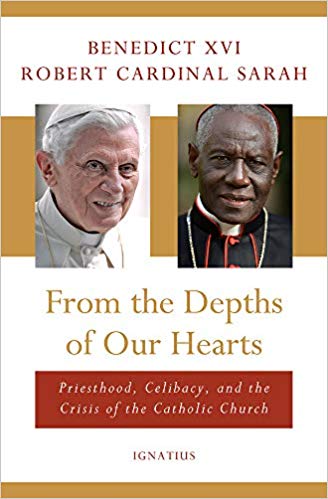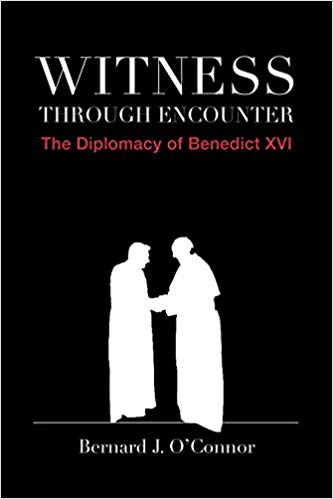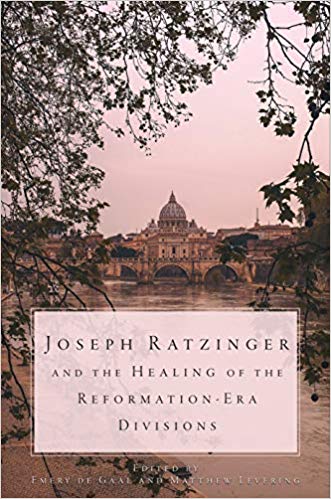- Benedict XVI, seven years after, by Andrea Gagliarducci. Monday Vatican 02/10/20:
A Benedict XVI text has passed almost unnoticed, unlike the book he wrote with Cardinal Robert Sarah on priestly celibacy: it is the letter that the Pope emeritus wrote last November to celebrate the 50th anniversary of the establishment of the International Theological Commission.
Benedict XVI’s text is of great importance to understand today’s challenges and how Benedict XVI tried to face them. ...
- The Ratzingerian Constants and the Maintenance of Harmony in the Church, by Bishop Robert Barron. 02/11/20:
Papa Ratzinger said that the Church performs three basic tasks: it worships God, it evangelizes, and it serves the poor. The religious activities of over a billion Catholics around the globe, he maintained, can be reduced finally to these three fundamental moves. ...
- Benedict XVI responds to criticism of his essay on the Church and the sexual abuse crisis Catholic News Agency. 08/27/19:
Pope emeritus Benedict XVI has responded to criticism of his essay on the abuse crisis, saying many negative reactions have confirmed his central thesis that apostasy and alienation from the Faith are at the heart of the crisis – by not even mentioning God in their critique of his essay.
In a brief statement in reaction to such criticism published in German magazine “Herder Korrespondenz,” the former pope pointed to a “general deficit” in the reactions to his essay, saying that many critical responses missed the very point he was making.
Upcoming Published Works by and about Pope Benedict XVI

| From the Depths of Our Hearts: Priesthood, Celibacy and the Crisis of the Catholic Churchby Benedict XVI (Author), Robert Cardinal Sarah (Author) Ignatius Press (March 12, 2020). 152 pages. The Catholic Church faces a major crisis and the turmoil in priestly ministry is at the heart of it. "The priesthood is going through a dark time," write Pope Emeritus Benedict and Cardinal Robert Sarah. “Wounded by the revelation of so many scandals, disconcerted by the constant questioning of their consecrated celibacy, many priests are tempted by the thought of giving up and abandoning everything."
In this book, Pope Emeritus Benedict and Cardinal Robert Sarah give their brother priests and the whole Church a message of hope. They honestly address the spiritual challenges faced by priests today, including struggles of celibacy. They point to deeper conversion to Jesus Christ as the key to faithful and fruitful priestly ministry and church reform. From the Depths of Our Hearts is an unprecedented work by the Pope Emeritus and a Cardinal serving in the Vatican. As bishops, they write “in a spirit of filial obedience” to Pope Francis, who has said, "I think that celibacy is a gift for the Church... I don’t agree with allowing optional celibacy, no." Responding to calls for refashioning the priesthood, including proposals from the Amazonian Synod, two wise, spiritually astute pastors explain the biblical and spiritual role of the priesthood, celibacy, and genuine priestly ministry. Drawing on Vatican II, they present priestly celibacy as more than “a mere precept of ecclesiastical law”. They insist that renewal of the Church is bound to a renewed understanding of priestly vocation as sharing in Jesus’ priestly identity as Bridegroom of the Church. This is a book whose crucial message is for clergy and laity alike. |
 | Witness through Encounter: The Diplomacy of Benedict XVI
by Bernard J. O'Connor
St. Augustines Press; 1 edition (January 20, 2020). 386 pages.
Appealing to dialogue is often just a safe way of referring to something negative, or at best blandly neutral: the avoidance of conflict, the denial of similarity, not stirring deep-seated disagreement, etc. When Bernard o’Connor says pope Benedict XVI facilitated dialogue, however, he means something quite positive, very much tangible and certainly transformative. In providing an account of the pope’s interactions with various groups of the international community, O’Connor attempts to convey Benedict XVI’s diplomacy as encounter, where even in the sphere of international relations exhortations to “dialogue” are invitations to see more clearly and be moved as much as move.
To dialogue is to embrace, revise perception such that our approaches to the great questions of our day are not simply shared but correct. As O’Connor writes, “Pope Benedict attempts to promote the outlook that a renewed emphasis upon objective, critical and structured philosophical reasoning positions practice, diplomatic and otherwise, to regain its lost foundation and framework. the quest for integrity, if nothing else, should motivate our fidelity to academic pursuit, to intellectual investigation, and to rigorous interdisciplinary inquiry. so influenced, practice will then reject what is arbitrary and be guided by what is time-tested and enduring.” O’Connor illustrates true dialogue emerging from the encounter, and in turn provides scores of characteristics of this encounter as it unfolds in papal diplomacy. In providing scores of addresses and speeches to various bodies, O’Connor presents pope Benedict XVI as an example of effective diplomacy that treats the meetings on the world stage as engaging in true dialogue. encounter is the true basis of dialogue and one that allows it to open to what is truly a catalyst for change toward cooperation––witness, both personal and collective. As o’Connor shows, “where there is authentic encounter, as meeting in mutual trust, what arises is context for witness.” If authentic even the diplomatic encounter has the means to deepen and transform one’s being. Witness Through Encounter intends to fulfill multiple needs. the diplomatic approach exemplified herein is singular and worthy of study among political scientists, sociologists, philosophers and diplomats eager to embrace a worldview that is more personal than simply humanistic. this work will also be useful in inter-religious settings. An additional advantage of O’Connor’s presentation of Benedict XVI’s diplomatic approach, his witness through encounter, is that it contains insight valuable to the scholar alongside the resources used. |
 | Joseph Ratzinger and the Healing of Reformation-Era Divisions
by Emery de Gaál (Editor) (Author), Matthew Levering (Editor)
Publisher: Emmaus Academic (November 1, 2019). 408 pages.
Edited by Emery de Gaál and Matthew Levering, Joseph Ratzinger and the Healing of Reformation-Era Divisions examines Joseph Ratzinger/Pope Benedict XVI's manifold contributions to Catholic-Protestant theological reflection. The collection opens with an introduction comparing Ratzinger's approach to ecumenism to that of Karl Rahner. Rahner argues that the structural uniting of Protestants and Catholics should take place now without worrying about doctrinal differences. In contrast, Ratzinger argues that unity in Christ requires probing the doctrinal differences and seeking a deeper understanding of the reasoning of each side—on the grounds that the truth of the Gospel that each side desires to preserve will ultimately be the basis for the only kind of Christian ecclesial unity worth having, namely, a unity of the basis of the truth of the Gospel of Jesus Christ.
Detailed essays follow, treating a number of loci including papal primacy, ecumenical principles, liturgy, evangelization, Mariology, Christ's birth and the celebration of Christmas, public theology, Christocentrism, Martin Luther, charity, conscience, missiology, justification, the reception of Ratzinger/Benedict in Radical Orthodoxy, and Scripture and Tradition. These essays run the full gamut of Ratzinger/Benedict's major themes and preoccupations. Ten of the essays are by Catholic scholars, and seven by Protestant scholars. Contributors include many of the world's leading Ratzinger experts, and the volume opens with an essay by Bishop Rudolf Voderholzer, Director of the Pope Benedict XVI Institute in Regensburg, Germany. |

No comments:
Post a Comment